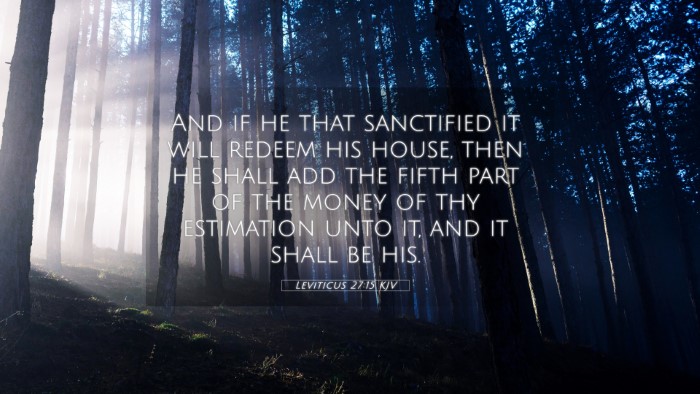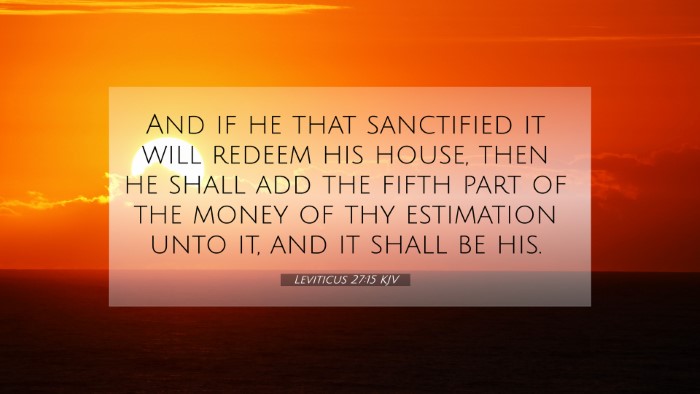Understanding Leviticus 27:15
Leviticus 27:15 (KJV): "And if he that sanctified it will redeem his house, he shall add the fifth part of the money of thy estimation unto it, and it shall be his."
Leviticus 27:15 discusses the laws concerning the redeeming of a dedicated house. This verse is part of God's instructions for the Israelites regarding how they should manage and redeem their possessions that were vowed to the Lord.
Summary of Insight from Public Domain Commentaries
Matthew Henry Commentary
Matthew Henry elucidates this verse by highlighting the principle of redemption, which reflects God's mercy. He indicates that if a person had dedicated their house to God and later wished to reclaim it, they could do so by paying an extra fifth of the estimated value. This stipulation reveals God's provision for repentance and the possibility of returning to previous commitments, reinforcing the idea that God desires reconciliation with His people.
Albert Barnes Commentary
Albert Barnes explains the economic implications of this verse. He points out that the added fifth is a compensation for the value lost during the time the house was dedicated. This approach not only serves as a practical measure but also instills a sense of responsibility among the Israelites regarding their vows. Barnes emphasizes that dedication to God does not mean forfeiting one's possessions without a chance for redemption, showcasing God's fair dealings with humanity.
Adam Clarke Commentary
Adam Clarke discusses the theological dimensions of this law. He notes that the requirement to add the fifth indicates a serious commitment to God and the consequences of vows. Clarke suggests that this practice stresses the importance of one’s integrity and accountability in promises made before God, which should be reflected in our modern walk of faith. His emphasis on the moral aspects provides insight into the character of God as just and merciful.
Key Takeaways
- The Principle of Redemption: The verse highlights the redemptive nature of God's laws.
- Responsibility: It underscores the importance of fulfilling vows and the consequences of those commitments.
- Economic Justice: The context reflects God’s provision for economic justice and fairness in transactions among His people.
- Theological Reflection: It invites readers to consider their own promises to God and how they manage those commitments.
Cross-References to Leviticus 27:15
- Leviticus 27:19: Discusses redeeming dedicated things, reinforcing the overarching theme of redemption.
- Numbers 18:15-16: Explains how dedicated things belong to God but are subject to redemption.
- Deuteronomy 23:21: Addresses the importance of fulfilling vows made to God.
- Psalm 76:11: Reflects the honor owed to God for any vows made.
- Matthew 5:33-37: Jesus’ teaching on oaths and the integrity of one’s word parallels the seriousness of vows in the Old Testament.
- James 5:12: Echoes the importance of honesty in speech and commitments, suggesting a continuity of the theme through the New Testament.
- Romans 12:1: Calls for the dedication of oneself to God, which resonates with the themes of consecration found in Leviticus.
Conclusion
In summary, Leviticus 27:15 emphasizes the principles of redemption, responsibility towards vows, and economic justice. Through the insights provided by various commentaries, believers can reflect on their own commitments to God and the nature of divine mercy and justice. This verse not only illustrates the ancient laws given to the Israelites but also resonates within the broader narrative of Scripture regarding the character of God, illustrating the interconnectedness of biblical texts and themes.



